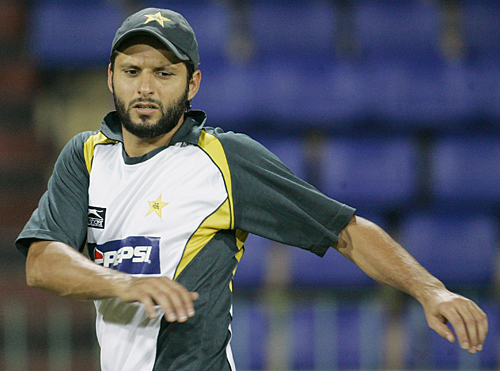Pakistan Tries Its Luck With an Unlikely Captain
Sports may specialize in tales of the improbable, but there are still some things you just don’t expect to see happen. On Wednesday, Shahid Afridi will captain Pakistan’s cricketers in a Twenty20 international against Sri Lanka in Colombo.
Think Michael Vick becoming president of the Humane Society of the United States, or Manchester United’s manager, Sir Alex Ferguson, being awarded the Freedom of Liverpool.
Of course not all national cricket captains are straight arrows like England’s Andrew Strauss. Should Afridi last very long in his new role, there is a good chance he will find himself tossing for innings with Ricky Ponting of Australia, whose issues with alcohol and betting once threatened to capsize his career.
Afridi, 29, has had a career whose colorfulness is eclipsed among current players only by his turbulent erstwhile Pakistan teammate Shoaib Akhtar. Afridi’s extensive rap sheet includes a four-match ban for insulting opponents and a match umpire; a dressing room dispute with his captain and vice captain over his place in Pakistan’s batting order; sanctions after a girl was found in his room — his explanation that she was seeking his autograph was not accepted — and being fingered as the provocateur two years ago when Akhtar finally lost it and struck a teammate with a bat.
There was a brief, mysterious and never fully explained retirement from test cricket three years ago, and as recently as last year the Indian star Vangipurappu Laxman, his captain in the first Indian Premier League tournament, complained that “Afridi has no team ethics.”
That he has survived at all is because of his exceptional talent. A dull or mediocre player — admittedly not a type often seen in Pakistan teams — would have been discarded long ago.
That Afridi is anything but dull or mediocre was made abundantly clear in his first international innings as a 16-year-old. Not for him the diffident, deferential entrance. Playing against Sri Lanka in Nairobi he struck bowlers who included the world-class Muttiah Muralitharan and Chaminda Vaas for 100 runs from only 37 deliveries, still the fastest century ever struck in a one-day international. He is also fourth on the list, with a violent 45-ball assault on India in 2005.
He has continued his career in that vein as the most destructive batsman around. He averages 111 runs per 100 balls, easily the fastest among those who have scored more than 1,000 runs, in one-day internationals. He also bowls fast, attacking wrist spin and is a fine fielder in a team often lacking in this respect.
The problem has been lack of consistency and judgment, overconfidently audacious stroke play that often costs his wicket when restraint would have produced better results. That he has played only 26 five-day tests in 11 years since his debut, and none in the last three, reflects the exasperation he has induced in captains and selectors.
His attributes might, though, have been designed with the Twenty20 format in mind. He bestrode this year’s World T20 tournament in England with both bat and ball, his innings in the semifinal and final taking Pakistan to its victory. Along with his brilliance, there was a fresh sense of him as a team man. When the 17-year-old paceman Mohammad Aamer beat the dangerous South African batsman Jacques Kallis in the semifinal, only to see the ball fly off the edge of the bat for four runs, it was Afridi who ran 20 meters to put an arm around his team-mate and encourage more of the same.
Much of the credit was due to Pakistan’s captain, Younis Khan, who reminded Afridi of his importance to the team but also counseled patience in his batting, pointing out that he did not need to strike every single ball for four or six.
Khan’s retirement from T20 created the opening for Afridi to step up. He has some experience of leadership in domestic cricket, and there may be a hint of his likely style in his criticisms of Shoaib Malik, Pakistan’s captain before Khan, for not being tough enough with his players.
It might be a short-lived experiment or could be the prelude to his stepping onto the big stage at some point should Khan, still one-day and test captain, lose form or fall victim to Pakistan’s ever-Byzantine cricket politics. But whether it lasts a day or a decade, Afridi’s tenure as Pakistan captain is unlikely to be dull. After all, nothing else in his career has been.


0 comments:
Post a Comment